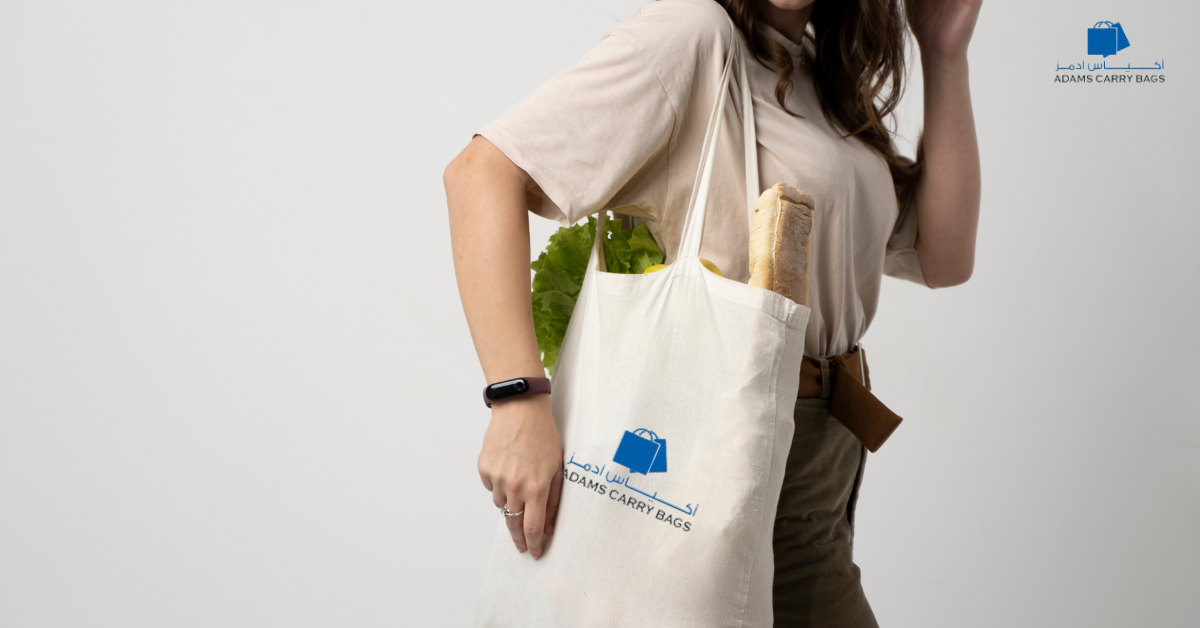In today’s environmentally conscious marketplace, consumers are increasingly seeking brands that prioritize sustainability. This shift presents a unique opportunity for B2B enterprises to differentiate themselves by adopting eco-friendly practices throughout their supply chains. One often-overlooked area with significant potential for positive impact is packaging.
This blog delves into the world of eco-friendly shoe bags, exploring how these innovative, reusable bags can elevate your brand’s commitment to sustainability while offering practical benefits for your B2B operations.
We’ll explore the advantages of eco-friendly shoe bags, delve into the different types of reusable bags available, discuss the environmental impact of traditional packaging, and outline the key considerations for choosing the perfect eco-friendly bags for your B2B needs.

The Rise of Eco-Conscious Consumers
The global conversation surrounding sustainability has reached a fever pitch. Consumers are actively seeking out brands that align with their values, with a significant portion willing to pay a premium for eco-friendly products and services.
For B2B enterprises, this shift in consumer behavior presents a compelling opportunity. By demonstrating a commitment to sustainability throughout your operations, you can build brand loyalty, attract new customers, and potentially command higher prices.
Why Eco-Friendly Shoe Bags Matter
Shoe bags, while seemingly insignificant, contribute significantly to the overall environmental impact of your B2B operations. Traditional shoe bags are often made from conventional plastics, which can take hundreds of years to decompose in landfills, releasing harmful toxins into the environment.
Eco-friendly shoe bags, on the other hand, offer a sustainable alternative. These reusable bags are typically crafted from recycled materials or biodegradable components, significantly reducing your environmental footprint.
The benefits of adopting eco-friendly shoe bags extend beyond environmental considerations.
Enhanced Brand Image: By implementing sustainable practices, you project a positive brand image, appealing to eco-conscious businesses and consumers alike.
Cost Savings: While the initial investment for eco-friendly bags may be slightly higher, their durability and reusability can lead to long-term cost savings compared to disposable options.
Improved Customer Satisfaction: Customers increasingly value brands that prioritize sustainability. Offering eco-friendly shoe bags demonstrates your commitment to environmental responsibility, potentially leading to higher customer satisfaction.
Exploring the World of Eco-Friendly Shoe Bags: A Look at Available Options
The world of eco-friendly shoe bags offers a diverse selection of reusable bags to suit your specific B2B needs. Here’s a closer look at some popular options:
Non-Woven Polypropylene Bags: These reusable bags are crafted from recycled plastic bottles, offering a lightweight and durable solution. Non-woven carry bags are typically breathable, allowing shoes to air out, and can be customized with your brand logo or messaging.
Organic Cotton Bags: For a truly eco-friendly option, consider reusable bags made from organic cotton. These high-quality bags are biodegradable and compostable, offering a sustainable end-of-life solution. Organic cotton bags are often sturdier and more luxurious than their non-woven counterparts.
Recycled PET Bags: Another excellent option is reusable bags made from recycled polyethylene terephthalate (PET). These eco-friendly bags are derived from post-consumer plastic bottles, offering a sustainable alternative to virgin plastics. Recycled PET bags are known for their strength and water resistance, making them ideal for protecting shoes during transport.
Jute or Hemp Bags: For a natural and rustic aesthetic, consider reusable bags crafted from jute or hemp. These plant-based materials are biodegradable and compostable, offering a truly sustainable choice. Jute and hemp bags are typically breathable and provide a unique visual texture. They are a great choice for businesses seeking an earthy and eco-conscious aesthetic.
Customizable Eco-Friendly Bags: Many manufacturers offer the ability to customize eco-friendly shoe bags with your brand logo, messaging, or even unique designs. This allows you to leverage these reusable bags as a subtle yet effective marketing tool, promoting your brand’s commitment to sustainability.
Beyond Sustainability: The Functional Benefits of Eco-Friendly Shoe Bags
While environmental benefits are a major advantage, eco-friendly shoe bags offer a variety of practical advantages for B2B operations:
Durability: High-quality, eco-friendly bags are designed to withstand repeated use, unlike their flimsy plastic counterparts. This translates to long-term cost savings and reduces waste generation.
Versatility: Eco-friendly shoe bags come in a variety of sizes and styles, allowing you to find the perfect fit for different types of footwear. Some bags even feature additional compartments for storing accessories like socks or shoe care products.
Branding and Recognition: Reusable bags with your brand logo can increase brand recognition throughout the supply chain. Customers who receive your products packaged in these bags will be reminded of your brand every time they use them.
Improved Storage: Eco-friendly shoe bags can help organize and protect footwear during storage. This can be particularly beneficial for businesses that handle large quantities of shoes.
Reduced Damage: Durable reusable bags can help prevent scratches, scuffs, and other damage during transport, potentially leading to fewer returns and customer satisfaction.
The Environmental Impact of Traditional Packaging
Traditional plastic shoe bags, while seemingly inconsequential, contribute significantly to environmental pollution. Here’s a closer look at the environmental costs associated with them:
Plastic Pollution: Traditional shoe bags are typically made from conventional plastics, which can take centuries to decompose in landfills. Over time, they break down into microplastics, contaminating soil and waterways, harming wildlife, and potentially entering the human food chain.
Resource Depletion: The production of conventional plastic shoe bags relies on non-renewable fossil fuels. This contributes to resource depletion and greenhouse gas emissions, accelerating climate change.
Landfill Waste: The vast majority of traditional shoe bags end up in landfills, taking up valuable space and contributing to overflowing landfills.
Choosing the Perfect Eco-Friendly Shoe Bags for Your B2B Needs
With a wide variety of eco-friendly shoe bags available, selecting the perfect option for your B2B needs requires careful consideration. Here are some key factors to keep in mind:
Material: Consider the environmental impact of the bag’s material. Opt for reusable bags made from recycled materials, organic cotton, or biodegradable components.
Durability: Choose high-quality bags that can withstand repeated use. This minimizes waste and ensures long-term cost savings.
Size and Style: Select the appropriate size and style for the type of footwear you will be packaging. Consider reusable bags with additional compartments for added functionality.
Branding: Explore customization options to showcase your brand logo and messaging. This leverages the bags as a subtle marketing tool.
Cost: While the initial cost for eco-friendly bags may be slightly higher, consider the long-term cost savings associated with their reusability. Factor in the potential for increased brand loyalty and customer satisfaction.
By carefully evaluating these factors, you can select the ideal eco-friendly shoe bags that align with your B2B needs and environmental goals.
Adopting eco-friendly shoe bags presents a compelling opportunity for B2B enterprises to elevate their sustainability efforts. These reusable bags, crafted from recycled materials, organic cotton, or biodegradable components, offer a multitude of advantages:
Reduced environmental impact: By minimizing plastic waste and resource depletion, eco-friendly shoe bags contribute to a healthier planet.
Enhanced brand image: Demonstrating a commitment to sustainability fosters brand loyalty and attracts eco-conscious customers.
Improved customer satisfaction: Customers increasingly value brands that prioritize the environment. Eco-friendly packaging showcases your responsibility and can lead to higher satisfaction.
Cost savings: While the initial investment may be slightly higher, the durability and reusability of eco-friendly bags translate to long-term cost savings compared to disposable options.
Practical benefits: These reusable bags come in various sizes and styles, offering functionality, storage solutions, and potential branding opportunities.
By transitioning to eco-friendly shoe bags, B2B enterprises can make a significant contribution to environmental sustainability while reaping numerous practical benefits. As consumer demand for sustainable practices continues to rise, adopting eco-friendly packaging solutions is no longer just a commendable act, but a strategic business decision.





